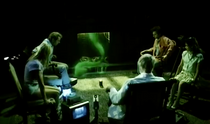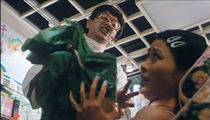Bio Zombie
- Eric Roe
- Dec 18, 2017
- 7 min read
Bio Zombie, 1998, Hong Kong. Director: Wilson Yip Wai-Shun.
Bio Zombie shares its setting and basic premise with George Romero's classic Dawn of the Dead: You have a small group of people who, in the midst of a zombie apocalypse, hole up in a shopping mall to try to survive. Where Dawn of the Dead plays it straight, Bio Zombie goes for comedy and slapstick. This was Wilson Yip's breakout movie, and I can see why: There are some truly inspired moments in the second half of the film. But I almost didn't make it that far. I'll acknowledge that I may have missed the point on some details due to my limited knowledge of Chinese culture -- but the first half of the movie just didn't strike me as funny or particularly interesting in any way.
Spoilers from this point on:
The film spends a good chunk of time introducing the people who will become the group of survivors, and we aren't given much to root for in these folks. The main duo consists of Woody Invincible (Jordan Chan Siu-Chun) and Crazy Bee (Sam Lee Chan-Sam, aka the rapper DJ Becareful), a couple of lowlifes who hit on women, assault and rob one of the women who has spurned their advances, intimidate and ridicule a customer who has the nerve to complain about a video that he bought from their store, play nasty practical jokes (such as getting a huge cockroach to run up a guy's shorts), rob a fellow mall employee at knifepoint, and insult everyone they come across. Woody is prevented from taking sexual advantage of a drunk woman (the same one who was assaulted and robbed by him and Bee earlier) only by the outbreak of zombies in the mall.

That this is all treated as comedy makes the first half of the movie unfunny and disturbing. Our secondary duo is comprised of Jelly (Bonnie Lai Suk-Yin) and Rolls (Angela Tong Ying-Ying, aka Miss Chinese Montreal 1995). That's right: The guys get "Woody Invincible" and "Crazy Bee," and the women get "Jelly" and "Rolls." We first meet these two at a sushi counter where Rolls takes advantage of the hapless Loi's affections to get food coupons. Played by Emotion Cheung Kam-Ching, Loi (called "Sushi Boy" by everyone) is a sweet, helpless, harmless, puppy-eyed boy hopelessly in love with Rolls. And he ends up being the main reason to stick around for the second half of the movie.

Rounding out our group of survivors are Kui (Wayne Lai Yiu-Cheung) and Mrs. Kui (Tam Suk-Mui). Kui is a cell phone salesman who struts as if he owns the mall and treats his wife like garbage. More on that later.

The zombie apocalypse is sparked during a shady chemical weapons deal between Japanese and Iraqis ("When it comes to producing biological weapons," the mediator says, "even the Americans are no match for the Iraqis"), but this is less interesting than what finally happens when the zombies infiltrate the mall. The first of our main characters to be zombified is poor Sushi Boy. He quickly kills a female employee and then attacks Rolls -- but rather than try to eat her, he knocks her unconscious, heads out into the mall, then returns with a gift. And it's here that the film finally ignites a spark of ingenuity, because in a typical zombie film, even one played for laughs, it's: Beware of zombies bearing gifts. Yahhh! What's in the box? Is it somebody's hand? Somebody's head? A dead puppy? I can't look!


Aaaaawwwwwww. Zombie Sushi Boy is still in love.
Later, a team of zombified football players arrives at the sushi bar, where Sushi Boy has been keeping Rolls. I love that one of the football zombies is still carrying the ball around.

Sushi Boy can't let the football zombies get to Rolls, who is hiding behind the counter. How can he distract them?

Okay, well, yeah, of course: finger sushi for the zombies. And look how nicely that's prepared.
Problem: One of the football zombies sees Rolls behind the counter and indicates that she should be enjoying these hors d'oeuvres as well. So Sushi Boy tries to get her to play along.
Here, eat this! Eat it!

Realizing what's at stake, Rolls tries her best, taking the finger sushi and growling like a zombie.

But it's no good. She can't do it. Sushi Boy ends up having to fight off the football zombies to protect Rolls.
Whenever zombie Sushi Boy is onscreen, the movie has magic. His devotion to Rolls remains steadfast, and he becomes the instrument of salvation (if only temporary) to Woody and Rolls near the end. To me, zombie Sushi Boy saves the movie too.
There are other inspired scenarios. At one point, for instance, Kui hides behind a vending machine from a zombie, and the only thing that saves him is the zombie's sudden preoccupation with trying to get a can of soda out of the machine, slapping at it and rocking it just like ya do when the machine won't give up its goods.

Speaking of Kui: The film wants us to identify Kui as an even bigger jerk than Woody and Bee, despite the fact that his verbal and emotional abuse of Mrs. Kui, while awful, comes nowhere near the degree of nastiness displayed in Woody and Bee's played-for-laughs "antics." Kui's elevated self-regard, his image of himself as an ultra-cool player, makes him a direct cinematic descendent of the arrogant uncool embodied by The Breakfast Club's Assistant Principal Vernon.


But the other characters, including Mrs. Kui, suffer Kui's not-actual-coolness and abuse mostly in silence. Because those aspects of his personality are not his true sin; his true sin, if gauged by what gets the others to actually react against him, is cowardice.
The others in the group first get a taste of Kui's cowardice early in the zombie outbreak, when they find a dead body in their hiding spot. Woody says they need to work together to move it before it becomes a zombie, and Kui nominates Mrs. Kui to help. Woody sees the cowardice and says, "You are despicable. We don't need your help, you chickenshit!" A little later, Kui admits to being too scared to go out into the mall to try to find a telephone to call for help. Mrs. Kui sticks up for him, begging Woody not to make Kui go. When he's not being a coward, Kui continues with his casual verbal abuse of Mrs. Kui. She continues to defer to him and even defend him, and the others, for the most part, continue their silence in the face of Kui's abuse. When Kui charges out of the group's hiding spot and runs right into a zombie, Mrs. Kui is the first to attack the zombie and try to get it off her husband.

It isn't until Kui goes full-on coward with no possibility of redemption that Mrs. Kui finally turns away from him. This descent comes when the group escapes to an elevator with zombies in hot pursuit. A buzzer sounds: The elevator is too full, and the doors won't close. Kui pushes Jelly out of the elevator, allowing the doors to close while the zombies go after and kill Jelly. Woody kicks Kui, and Bee holds a knife to his throat: "What is wrong with you?! I'm gonna kill you!" Their reactions likely arise more from outrage for what Kui has done to Jelly than from reactions against his cowardice, though the cowardice caused the action. But when the elevator lands and everyone else leaves, Mrs. Kui lingers when Kui calls to her. Kui is hunkered down, physically cowering, and he shows his wife a truly pathetic face.

Mrs. Kui simply watches him for a moment, and it's as if she's waiting to see if he'll man up and own his actions or at least recover to his overcompensatingly cocky, abusive self as he has after his previous displays of cowardice. But his face tells her he's gone this time; there's nothing left but coward. And this is when Mrs. Kui finally slaps him and then ditches him.

So, by this movie's internal logic, it's not abuse, robbery, assault, or attempted rape, but cowardice that is the unpardonable sin.
Even Sushi Boy, a soft, sweet pushover before his zombification, leaves cowardice behind to protect Rolls from the footballers and, later, to force open the parking garage door so that Woody and Rolls can escape.

To me, Sushi Boy is the hero of this story: He loses his humanity upon first being turned into a zombie, but then he seizes it again, holding onto his love for Rolls to the extent that he abandons cowardice and ultimately embraces self-sacrifice, allowing Rolls to escape with Woody and live (for a few minutes more) rather than turning Rolls into a zombie so that he could be with her.
An argument could be made that Woody ultimately performs self-sacrifice as well. He and Rolls escape and make it to a gas station. Woody gets out to find help, but all he finds is a TV displaying a warning against drinking tainted soda pop, because it's the soda pop that's turning people into zombies (this goes back to the chemical weapons deal that ignited this particular apocalypse).

Woody turns just in time to see Rolls, back at the car, drinking from a bottle of the tainted soda. It's too late to stop her. He goes back to the car and, resigned, gulps a good swig for himself.

So Woody will soon turn into a zombie with Rolls. Is this self-sacrifice? If it is, it's not on the same level as Sushi Boy's sacrifice. Sushi Boy saved Rolls and Woody so that there could be more life; Woody's drinking the soda seems more like an act of resignation, an embrace of defeat -- in its own way, an act of cowardice.
Only love can make your rotting zombie heart proclaim, "Let there be more life!" Here's to you, Sushi Boy.














Comments